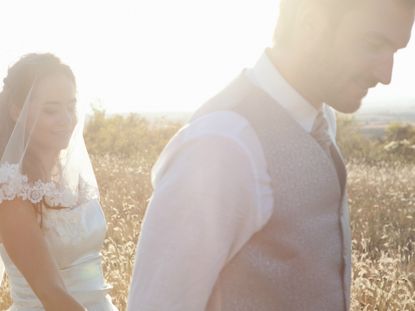'I was a virgin until marriage - it took me years to get over the shame of sex'
As part of our series examining shame and sex, writer Lily Dunn explains why waiting until marriage to lose her virginity left her feeling unhappy and confused...

As part of our series examining shame and sex, writer Lily Dunn explains why waiting until marriage to lose her virginity left her feeling unhappy and confused...
Most people don’t associate 'sex' with 'church', but when I was growing up as an Evangelical Christian in the American South, I felt like we talked about sex constantly. We just spent all of that time talking about how and why to not have it.
I hit my teenage years during the height of a movement known as purity culture. My peers and I signed purity pledges at True Love Waits banquets and perfected the art of the side-hug to minimize compromising chest-to-chest contact with the opposite sex. My Christian high school actually had a (loosely enforced) “six-inch rule” that mandated we maintain a six-inch distance from members of the opposite sex at all times. We called it, 'Leaving room for the Holy Spirit.'
When I reached the age of 11 or 12 I learned that my body—the same body that had climbed trees and cannon-balled into swimming pools—had morphed into a dangerous weapon overnight. This new body had the power to tempt others into sin and to attract unwanted attention. In the great battle to remain pure, I learned to fear my own skin. I was ashamed of my breasts, of the shape of my legs and the curve of my butt. 'Boys are very visual,' my pastors, teachers, and parents told me. 'You need to be careful about what you wear and how you present yourself. You are responsible for not making them stumble.'
I learned to keep those objectionable parts of my body covered. I wore undershirts tucked into my pants every day to prevent even a strip of bare belly showing if I bent or twisted the wrong way, and I stopped wearing shorts altogether.
If my body was something to be ashamed of, then my budding sexuality was even more so. Boys, I knew, were interested in sex. According to everybody I spoke to, itwas all they were thinking about. But a girl’s relationship to sex seemed purely perfunctory. A good girl never let boys have sex with her, and a good wife always let her husband have sex with her. Sex was something a girl permitted or denied, not something she desired on her own.
Discovering that I was curious about sex—maybe even interested—was a source of private shame for years. I felt dirty, and because I didn’t know that other girls felt the same way, I also felt unnatural and unfeminine. It seemed clear to me that regardless of whether or not I was having sex, having an interest in sex was both wrong and abnormal. In my shame, I learned to pretend that I was uninterested in sex and to view anyone who was as dirty.
Marie Claire Newsletter
Celebrity news, beauty, fashion advice, and fascinating features, delivered straight to your inbox!
I was a good girl. I followed the rules and I did things by the book. I made good grades and graduated with honors. I didn’t break curfew and I never partied. And when I married my college sweetheart at twenty-two, I did so as a virgin in a white dress.
What happened next seems only logical now, but at the time I was blindsided. I expected there to be a learning curve when it came to sex, but I also believed that it would be fun and easy, free of guilt and shame—a luxury afforded me by my years of sexual purity.

I wasn’t prepared for the storm of shame that hit me in the first few months of my marriage. For starters, my body didn’t seem to want to cooperate. I’d spent years keeping my sex drive in check. Then suddenly, in the space of just a few hours, I was supposed to stop feeling like my sexuality was something to be ignored and controlled and transform into a sex goddess. My body was having none of it.
After my body finally got on board, a new wave of shame hit. Bizarrely, I found that I was embarrassed to no longer be a virgin. Even though the whole reason for being a virgin was to enter marriage as one, it had become such a crucial part of my identity that it was mentally hard for me to give up. I couldn’t look at myself the same way.
Eventually, I let go of my identity as a virgin and realized that I really liked having sex with my husband. It was great, but somehow it led to even more shame. I’d spent a great deal of time and energy programming myself to equate sexual desire with guilt and fear – this was how I kept myself in check throughout my single years. But that 'red flag' feeling I'd trained myself to obey didn’t immediately go away the day I spoke my wedding vows. I couldn’t automatically flip some switch and no longer feel guilty about expressing the sexual feelings I’d been ignoring for years. For weeks I fought that sick feeling of guilt that settled in the pit of my stomach every time I had sex.
None of it made any sense – I felt like I needed to be both pure and chaste without any sexuality of my own and to simultaneously be able to fulfill every fantasy. I needed to be the virgin and the whore all wrapped into one. I was doomed to fail.
There is a happy end to this story. Little by little, I came to understand that my view of my body and of my sexuality was flawed. I began to build a more holistic view of both, one that told me I didn’t have to choose between being a slave to my sexuality and repressing it. When I rejected this false dichotomy, I could embrace my sexuality and enjoy it without shame.
Five and half years into my marriage I feel free from the shame and the guilt that used to overwhelm me. In my marriage, sex is not a performance, it’s a collaboration. I feel completely safe, completely accepted, and completely loved by both myself and my husband.
In some ways, I am unrecognizable from the girl I was growing up, but I still believe there is something sacred about sex. I believe that it has meaning beyond the physical act and I am thankful to share it now with someone I love deeply and am committed to. But I also believe that there’s a way to value sex without conferring shame.
If I ever have a daughter I will do my best to teach her to love her body completely and unconditionally. I will tell her that her sexuality is a God-given part of who she is. It is one part among many, but it is just as good and valuable as all the other parts. I will make sure she knows that it is normal to be interested in sex and not something to be ashamed of. I will teach her to honor her body and to respect herself as much as she does others. Instead of instilling fear of making bad choices, I will remind her that she is strong and capable and can be trusted to make good decisions. Most importantly, I will teach her that shame is a voice we can silence with bigger truths. Shame only wins if we let it.
Lily Dunn is a freelance writer, avid traveler, and ice cream connoisseur. She recently moved from South Korea to South Carolina where she lives with her husband and two cats. You can find her on Twitter @lilyellyn or on her blog at https://lilyellyn.com.
The leading destination for fashion, beauty, shopping and finger-on-the-pulse views on the latest issues. Marie Claire's travel content helps you delight in discovering new destinations around the globe, offering a unique – and sometimes unchartered – travel experience. From new hotel openings to the destinations tipped to take over our travel calendars, this iconic name has it covered.
-
 Bulgari Serpenti: Uncovering the beauty of a bijoux bag
Bulgari Serpenti: Uncovering the beauty of a bijoux bagBy Jessica Bumpus
-
 Ever wondered, what kind of workout is Pilates? Your guide to the viral workout loved by celebs and PTs
Ever wondered, what kind of workout is Pilates? Your guide to the viral workout loved by celebs and PTsYour need-to-knows.
By Abbi Henderson
-
 What is it about The Row that makes it so covetable?
What is it about The Row that makes it so covetable?Our Fashion Editor charts the rise and rise of the stylishly stealthy brand
By Natalie Hughes